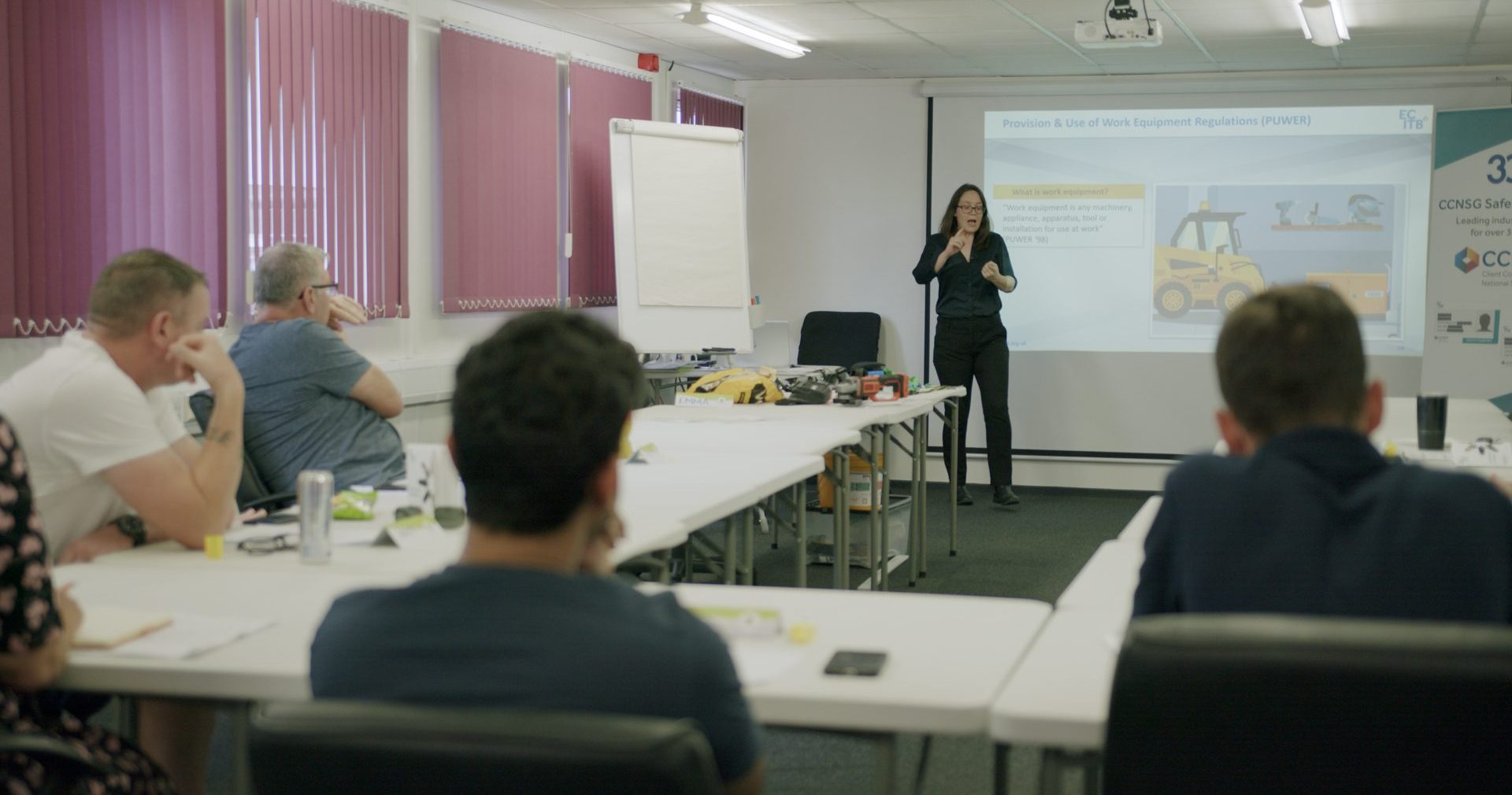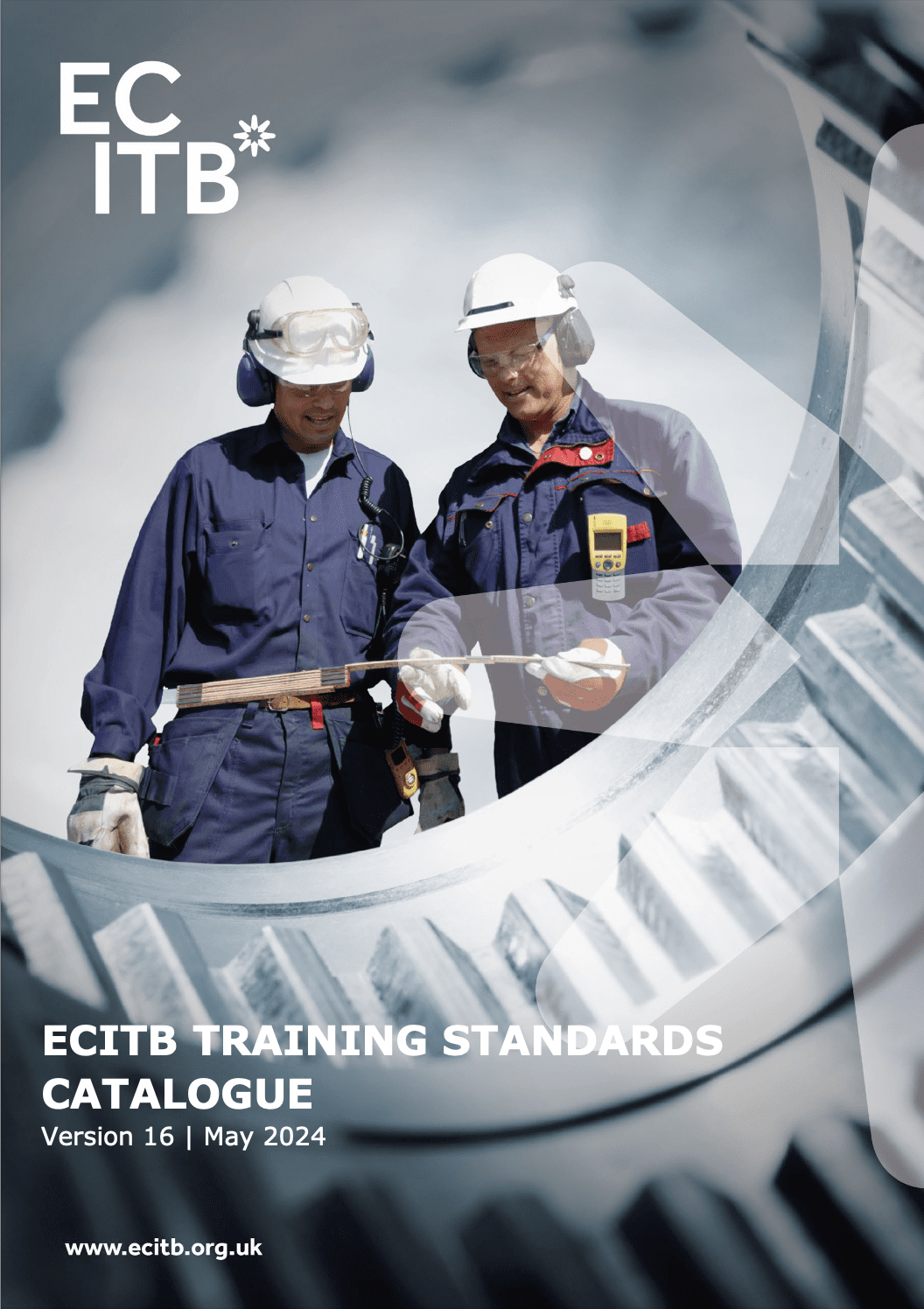Training Standards content is aligned to the performance and knowledge criteria of existing standards such as National Occupational Standards (NOS), a related ECITB-regulated qualification or another nationally recognised standard/approved code of practice.
All training standards specify practical activities and consolidation of the training such as a knowledge test or submission of a personal action plan that must be included in any course developed against them.
Some standards include pre-requisites that must be met by any learner attending a course developed against them.
Courses developed by training providers against ECITB training standards can be submitted to become ECITB-approved courses through the Provider Course Approval Scheme (PCAS).
Available training standards
Technical and trade
Site operations
Abrasive wheels
A group of three training standards that cover the principles of abrasive wheels, hand-held abrasive wheels and mounted abrasive wheels.
Confined space (including low, medium & high risk)
A group of five training standards that cover the appreciation and principles of working in confined spaces and the requirements that are specific to working in low, medium and high-risk confined spaces.
Basic grinding, profiling and polishing
A training standard for basic grinding, profiling and polishing pipework and plate that, along with the abrasive wheels TS, details the requirements for a foundation-level course on removing marks, levelling and cleaning the surface of several materials.
Mechanical Joint Integrity (MJI)
MJI
A group of nine training standards that detail the content of training courses from MJI first principles to the following for bolted connections: • hand torque (flanges and clamps) • hydraulic torque (flanges and clamps) • hydraulic tensioned (including subsea) • powered torque gun • torque and tension for wind turbines (MJI 33)
Small Bore Tubing (SBT)
SBT
A group of three SBT training standards that detail the content for training courses that cover isolations, dismantling techniques, inspection of components, shaping components, replacing components and installing small bore tubing assemblies: • assemble and install small bore tubing o assemblies - twin ferrule o with cone & threaded medium and high pressure • hydrotest SBT assemblies
Mechanical
On-site machining
These training standards set out the requirements to create training courses and give workers the knowledge and skills to safely and correctly undertake: • on-site pipe cutting and pipe end weld preparation • on-site joint face machining (full and raised flanges, RTJ and clamp connector hubs) • on-site drilling and thread taping • on-site milling. There are ECITB-approved courses available from approved providers for on-site machining.
Welding
See also managing welding operations under supervisor training standards.
Welding pipe
This suite of training standards sets out the knowledge and skills requirements for training in interpretation of welding procedures, specifications and standards in engineering construction and joining pipe through the following welding methods: • TIG • flux cored • TIG/MMA • MMA • MIG/MAG
Welding plate
This suite of training standards sets out the knowledge and skills requirements for training in the interpretation of welding procedures, specifications and standards in engineering construction, gouging and joining plate by: • TIG • flux cored • TIG/MMA • MMA • MIG/MAG
High integrity welding
This suite of training standards sets out the training requirements for: • welding metallurgy • main steam pipe CrMoV high integrity manual and semi-automated welding (paired welder) • TIG welding – tight access, restricted visual access, high alloy ferritic, creep resistant steel, duplex steel, high nickel alloy • TIG/MMA welding – tight access (paired welder), stainless steel large bore pipe, nickel alloy large bore pipe and window welding • MMA welding – stainless steel pipe and high alloy creep resistant • non-purged welding of high alloy pipe • orbital welding
Erecting & Rigging
Slinger/banksman
This training standard sets out the requirements to train and assess a slinger/banksman to understand and carry out their role including: • the different equipment to use • the related health and safety legislation, regulations and codes of practice • the methods of communication • requirements for inspection and risk assessment • how to prepare loads for lifting • how, under supervision, to perform a lifting operation in accordance with the lift plan • how to carry out post lift completion checks correctly
Appointed persons moving loads
This training standard sets out the requirements for a four-day training course on managing and planning lifts or moving loads on engineering construction sites. Includes a requirement for a one-day practical consolidation test of lift planning and performance.
Wind turbine
Wind turbine hub rescue
This training standard requires learners to have a level of skill in first aid, rope access, confined space, working at height and manual handling. It details the training required on: • the equipment required • evacuating a casualty • actions to take after rescuing the casualty
Torque and tension wind turbine bolted connections
This training standard details the content of a training course to enable cross-sector skills and knowledge to work safely in verified bolting activities on wind turbines and includes the following for wind turbine bolted connections: • hand torque • hydraulic torque • hydraulic tension
Wind turbine statutory inspection
On completion of courses developed against these standards, the turbine technician is able to safely enter, access and egress and perform duties associated with electrical generation to: • inspect and maintain • the in-service lift • compact and Davit cranes • fall arrest equipment • first aid boxes
Professional and management
Supervisor
Supervising excavations
This standard details the key learning required to effectively supervise excavations including understanding the legislation and regulations, potential hazards, planning (including permits, methods etc), controlling, managing, communicating, dealing with emergencies and reinstating the site.
Human performance
The human performance (HuP) training standards set out the key learning needed to be able to explain the importance of taking a human performance approach to safety and business effectiveness, the range of HuP models, error prevention tools and how to apply them to reduce errors.
Root cause analysis
The root cause analysis standard sets out the learning required to undertake root cause analysis including identifying the goals, pulling together a team, gathering the data, analysing the data and producing an effective report.
Managing welding operations
A series of training standards that detail the learning required to supervise welding operations including controlling welding operations on site, determining and securing resources, welding procedures and processes, characteristics of materials as well as interaction with other departments including quality and subcontractors for heat treatment and non-destructive testing.
Design & Draughting
Plant layout and design
A series of training standards that set out the key learning points for training in plant layout and design such as incorporating pipe racks and sleepers, flares, fired heaters, heat exchangers and air coolers, storage tanks, horizontal and sloping vessels, pumps and turbines etc.
Commissioning and start up manager and Commissioning and start up engineer
These training standards set out the requirements to create training courses about commissioning and start-up (CSU) including developing the processes, procedures as well as implementing CSU through to testing and handover.
Introduction to offshore decommissioning
This training standard sets out the requirements to create a training course that provides a deeper understanding of the environmental, legal, economic and health and safety aspects of decommissioning.
Commercial & Contract
Commercial awareness
A series of training standards introducing commercial awareness alongside higher-level commercial knowledge and skills including commercial and contract terms, setting up projects in a modern contracting environment, managing expectations and commercial performance of engineering construction projects.
Project Control
Project controls, estimating, planning, scheduling and cost control
A series of training standards each setting out the key learning required for different elements of project control etc. including: • estimating • planning, scheduling • requirements definition and setting the baseline • cost control • risk and assumption management • statistical analysis including earned value analysis • optimisation. These standards provide the curriculum for courses for level 2 (GCSE equivalent), level 3 (A Level/Scottish Highers) to foundation degree equivalent.
Sign up for updates
Your information will be used to subscribe you to our e-newsletter.
For more information, please see our Privacy Notice.





